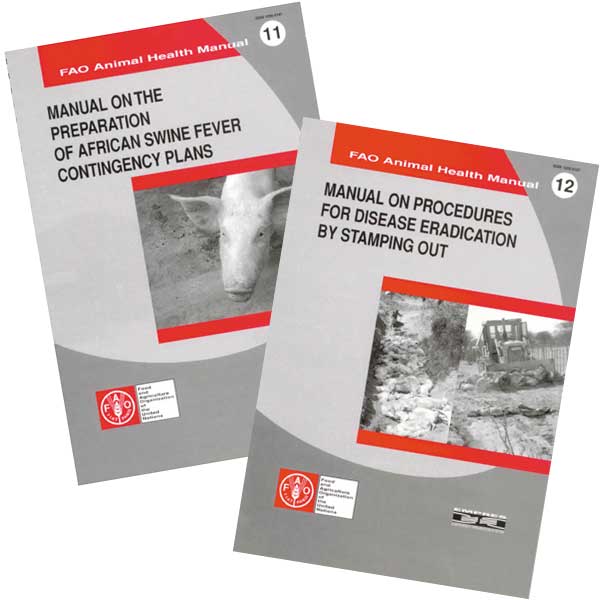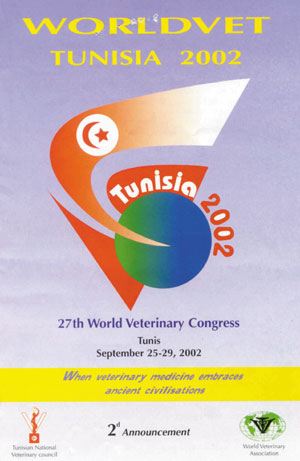Two new manuals have been added to the list of FAO Animal Health manuals. The first one is entitled Manual on the preparation of African swine fever contingency plans, and is an aid to emergency preparedness for major transboundary diseases of livestock. It provides information on the nature of ASF and the principles and strategic options regarding prevention, control and elimination of the disease. A suggested outline of the format and contents of a national ASF contingency plan is provided.
The second manual is entitled Manual on procedures for disease eradication by stamping out. Since stamping out is often the most cost-effective way for rapid elimination of an infection before it can become endemic, the manual provides guidelines on ways of implementing the stamping-out policy.

|
FAO ANIMAL HEALTH MANUALS
These and other FAO documents can be purchased through FAO sales agents. A complete list of publications, prices and agents is available at www.fao.org/catalog/giphome.htm, or contact: Sales and Marketing Group, FAO |
The attention of the Bulletin has been drawn to a letter which appeared in the last issue of The Veterinary Record. It discussed the possible termination of the Centre for Tropical Veterinary Medicine's (CTVM) course on International Animal Health by 2002, caused by lack of funds. Below are some extracts.
It is increasingly likely that the MSc programme run by the Department of Tropical Animal Health, University of Edinburgh, will close down in 2002, accompanied by disbanding of the training group within the Centre for Tropical Veterinary Medicine (CTVM). We see the closure as another stage in a downward spiral which is eroding the capacity of the UK to train and provide support to key veterinary services at home and abroad.
The current MSc in International Animal Health offers a unique training in the epidemiology and control of the diseases of international importance, complete with simulation exercises on the control of epizootic diseases including foot-and-mouth disease. Graduates of the programme have attained senior posts in state veterinary services and international organisations such as the Food and Agriculture Organization and the World Health Organization. The UK government now provides little support for training of overseas veterinarians in this field, in contrast to other European development agencies. In addition to training, a strong case can be made for retaining a broad expertise in universities, capable of contributing to debate on national and global issues and policies on animal health.
Edinburgh University now finds it difficult, on economic grounds, to justify retention of the CTVM teaching programme. Investment in training is as important as research if the UK wishes to play a leading role on the international animal health stage in the future.
Source: The Veterinary Record, 15 September 2001
The 27th World Veterinary Congress (WORLDVET) will take place in Tunis from 25 to 29 September 2002. It is being organized by the Tunisian Veterinary Council in association with the World Veterinary Association. With the theme "When veterinary medicine embraces ancient civilizations", it is billed by the organizers as the first large veterinary event of the third millennium.
The four-day congress will be held at the KRAM Exhibitions Park and the International Trade Centre, both located at a distance of few hundred metres away from the Mediterranean seashore.
A call has been made for speakers and deadline for submission of entries is 1 April 2002. Useful information can be obtained through the Organizing Committee in Tunis, at the following address: http://worldvetunisia2002.com.
